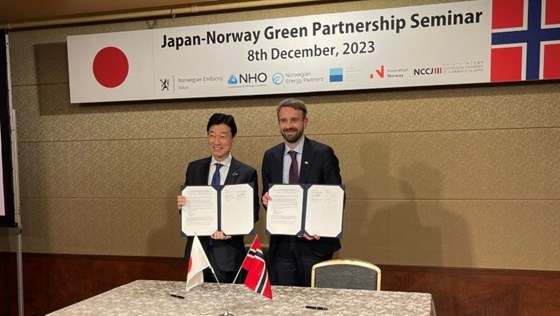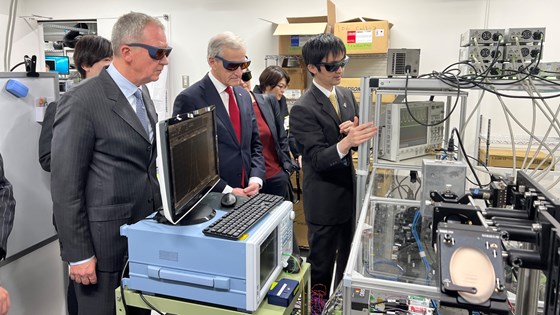Strengthening cooperation on the green transition
News story | Date: 08/12/2023 | Office of the Prime Minister, Ministry of Trade, Industry and Fisheries
Norway and Japan have agreed to cooperate more closely on the green transition. This will open up major opportunities for Norwegian companies.
Prime Minister Jonas Gahr Støre and Minister of Trade and Industry Jan Christian Vestre are visiting Japan this week, accompanied by a Norwegian business delegation. Following a meeting on Thursday, Prime Minister Støre and Japanese Prime Minister Fumio Kishida issued a joint declaration on the establishment of a strategic partnership between the two countries.
On Friday, Minister of Trade and Industry Jan Christian Vestre and his Japanese counterpart Yasutoshi Nishimura signed a joint declaration on establishing closer cooperation on the green transition.

Major global power
‘Japan is a major global power and the world’s third largest economy. The country is the world’s fifth largest consumer of energy, but is working to become carbon neutral by 2050. This is creating significant opportunities for Norwegian companies that have expertise and technology of vital importance to implementing the green transition,’ said Prime Minister Støre.
The Government is seeking to facilitate closer cooperation between the Norwegian and Japanese business sectors. Japanese companies must be given opportunities to make use of Norwegian expertise, technology and investments.
‘Norwegian companies are already contributing to Japan’s green transition, but we are taking steps to enable Norwegian companies to increase their market shares. Under the new partnership, we will promote even closer cooperation on the green transition, in areas such as offshore wind, green transport, batteries and hydrogen,’ Mr Vestre said.

Offshore wind and hydrogen
Norway is seeking to promote Norwegian expertise in the areas of offshore wind, hydrogen, ammonia, battery technology, and carbon capture, use and storage (CCUS). These are also key priority areas in Japan’s green transition.
‘Our aim is for Japanese companies to view Norway as a credible and preferred partner in the effort to develop greener Japanese industry. This will benefit the business sectors in both countries as we work together to build a sustainable future. We are seeking to facilitate increased trade and more cross-border investments, as well as cooperation that leads to innovative solutions that are essential to the green transition,’ said Prime Minister Støre.
On Friday, representatives from the Japanese and Norwegian business communities took part in a seminar in Tokyo. The seminar focused on cooperation relating to renewable energy and the green maritime sector. These are areas where Norwegian companies have expertise and technology of interest to the Japanese market.

‘We have had constructive discussions on common opportunities and challenges relating to the green transition. Here in Asia, networking and relationship-building are particularly important. It is vital to talk together face to face, to foster common understanding and new ideas. That is why I am pleased that both we politicians and the members of our business delegation have had this chance to have discussions with our Japanese partners,’ Mr Vestre said.
Facts about Norway’s trade with Japan
- Japan is Norway’s third largest trading partner in Asia (after China and South Korea)
- In 2022, trade with Japan amounted to just over NOK 25 billion (goods) and NOK 6.6 billion (services). This makes Japan our 17th largest export market for goods and our 19th largest for services.
- Seafood exports accounted for 47 % of Norway’s exports to Japan.